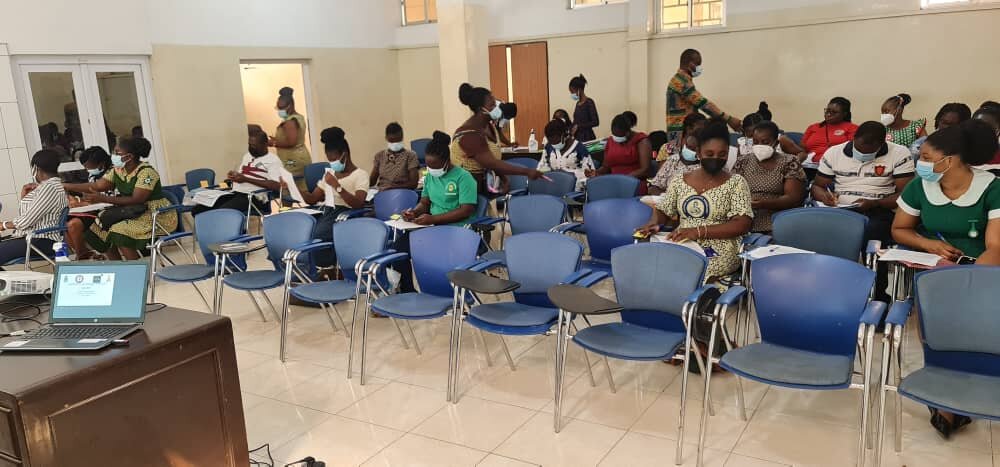
How a C/Can project is strengthening paediatric cancer services in Kumasi
As a rule, children with cancer in LMICs get less medical attention than adults with the disease, and sadly, the situation in Ghana’s second city of Kumasi illustrates the challenge of providing equitable cancer care for children.
Ghana has two paediatric oncology centres: one in Accra and the other in Kumasi, the latter being set up in 1998 as part of the general paediatric ward, with just 19 beds. Epidemiological data worldwide shows a wide variation in childhood cancer with the incidence at 80 – 150/million per year. There is no reliable data for sub-Saharan Africa due to the absence of population-wide cancer registries. In Ghana, about 150 to 250 cases are reported in the two Paediatric Oncology Centres yearly.
The C/Can Situation Analysis Report noted in 2018 that among the main obstacles to treating childhood cancer were the lack of adequate facilities to provide medical oncology services in public hospitals due to inadequate diagnostic services, unavailable, unaffordable, or irregular supplies of chemotherapeutic agents, limited access to suitable protocols and inadequate supportive care.
In response, after Kumasi joined the C/Can network in 2017, the City Executive Committee decided to implement a project entitled Strengthening Paediatric Cancer Services in Kumasi. The paediatric oncology networking project aims at improving early diagnosis of common childhood cancers and treatment completion in Kumasi city and its catchment area.
To date, this is what has been initiated in Kumasi:
Supported by the Sanofi Espoir Foundation, C/Can coordinated the creation of referral mechanisms between the Komfo Anokye Teaching Hospital, Paediatric Oncology Unit in Kumasi (KATH) and facilities in the Kumasi catchment area through the Oncokids App to ensure continuity of care and reduce treatment abandonment.
“Oncokids is a mobile platform specifically developed to make referring patients easier in Kumasi and its catchment area. KATH mandated an IT developer for the design and implementation of the app and has full control of it to allow access for any facility to use,” explains Dr Vivian Paintsil, Head of Paediatric Oncology at KATH.
Healthcare professionals trained to recognize early warning signs and to conduct basic diagnosis and management of childhood cancers
As part of the project, 120 healthcare workers were trained on the concept of referral and on the referral mobile app, and 24 Senior health staff granted access to use the referral app from share care and satellite sites.
Dr Osei Tutu, Paediatric Oncologist at KATH adds: “The project also fulfilled the goal of training healthcare professionals to recognise early warning signs and to conduct basic diagnosis and management of childhood cancers, as well as establishing community engagement to create public awareness of early warning signs and symptoms of childhood cancers.”
“This involved identifying and endorsing the criteria, roles and responsibilities of Share Care and satellite sites, as well as collecting data for monitoring children referred by these sites and conducting meetings every three months with them on early referral and treatment continuity of childhood cancer,” explains Dr Osei Tutu.
Expected Outcomes
“Through the successful implementation of the proposed work listed above, intermediate outcomes will be achieved including an increased proportion of facilities using the share care referral network,” explains Dr Paintsil. She adds: “In the long term, the outcomes of the project will be to increase the number of patients with access to paediatric oncology services and improve early detection of common paediatric oncology services. Data fed into the Kumasi cancer registry linked to all the healthcare facilities will provide a basis for research, policy and decision making, providing an added long term and sustainable value.”
Sustainability at the core of the project
As Sophie Bussmann-Kemdjo, C/Can’s Regional Director for Europe and Africa, explains: “The C/Can model is based on sustainability, guaranteeing the continuity and long-term impact of cancer care solutions. Local ownership of the model and leadership to sustain the changes through continuous partnerships and resource mobilisation efforts is essential to achieve the longer-term expected outcomes and impact on cancer care in Kumasi.”
We would like to take this opportunity to thank all C/Can partners, especially Foundation S – The Sanofi Collective, for their support in this initiative.





